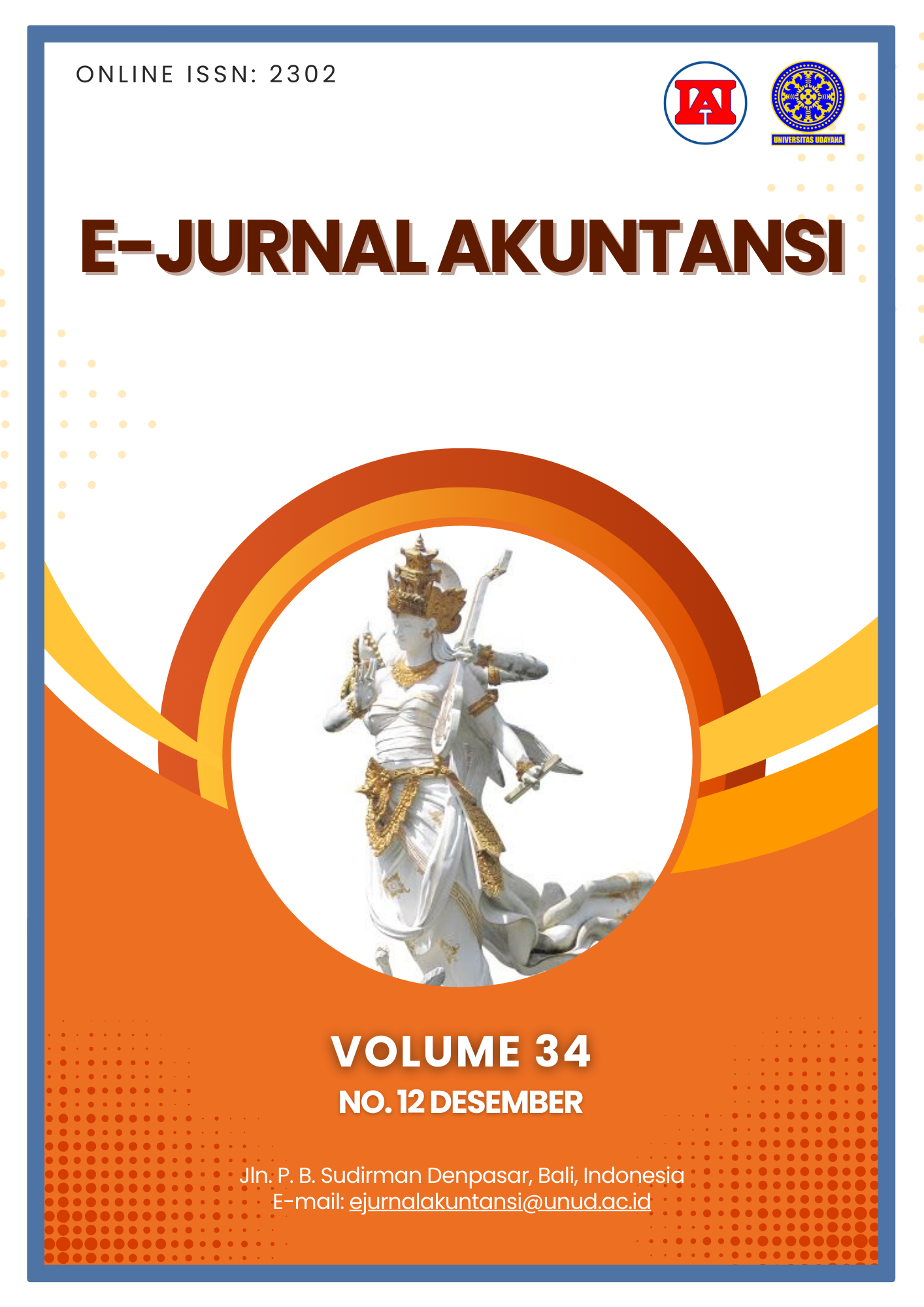Enhancing Accounting Students' Competencies through Digital Accounting Information System Design
Abstract
This study aims to develop a learning model that integrates the ADDIE approach with project-based learning to enhance students' analytical skills and deepen their understanding of accounting concepts. The model focuses on the design of accounting information systems using Excel Visual Basic for Applications (VBA), providing a practical, technology-driven framework for accounting education. The research adopts a Research & Development (R&D) methodology grounded in the ADDIE development model. This model encompasses five key stages: conducting a needs analysis, designing the learning framework, developing materials and learning scenarios alongside Excel VBA applications, implementing the model, and evaluating its effectiveness in achieving learning outcomes. The findings reveal that the project-based learning model for accounting information system design using Microsoft Excel VBA is both valid and effective. It significantly enhances students' understanding and skills in the Accounting Study Program at STIE Enam Enam Kendari. Validation results confirm the high quality of the developed learning model and its potential for effective implementation in accounting education, offering valuable insights for improving teaching and learning processes in similar academic settings.
Downloads
References
Almelhi, A. M. (2021). Effectiveness of the ADDIE Model within an E-Learning Environment in Developing Creative Writing in EFL Students. English Language Teaching, 14(2), 20. https://doi.org/10.5539/elt.v14n2p20
Bailey, C., & Ragland, L. (2022). Developing Students’ Skills-Based Competencies: A Strategic Learning Approach. The Accounting Educators’ Journal, 32, 37–70.
Cahyadi, R. A. H. (2019). Pengembangan Bahan Ajar Berbasis Addie Model. Halaqa: Islamic Education Journal, 3(1), 35–42. https://doi.org/10.21070/halaqa.v3i1.2124
Chusna, Z., & Haenilah, E. Y. (2022). Development of Excel-Based Learning Media to Improve Understanding Statistical Concepts.
Dick, W., Carey, L., & Carey, J. O. (2015). The Systematic design of instruction (8th ed.). Upper Saddle River, New Jersey: Pearson.
Fitriani, F. S., Harahap, R. D., & Nurlaila, N. (2023). Perkembangan UMKM Di Indonesia: Peran Pemahaman Akuntansi, Teknologi Informasi dan Sistem Informasi Akuntansi. Owner, 7(3), 2518–2527. https://doi.org/10.33395/owner.v7i3.1427
Howard, J. L., Bureau, J. S., Guay, F., Chong, J. X. Y., & Ryan, R. M. (2021). Student Motivation and Associated Outcomes: A Meta-Analysis From Self-Determination Theory. Perspectives on Psychological Science, 16(6), 1300–1323. https://doi.org/10.1177/1745691620966789
Januszewski, A., & Buchalska-Sugajska, N. (2022). Online Managerial Accounting education during the COVID-19 pandemic: A case study from Poland. Procedia Computer Science, 207, 215–226. https://doi.org/10.1016/j.procs.2022.09.054
Khan, A. (2022). Development of Employability Framework through Skill-Discrepancy Method: A Perspective of LIS Interns and Librarians in the University of Peshawar, Pakistan. International Information & Library Review, 54(1), 39–52. https://doi.org/10.1080/10572317.2021.1873052
Malan, M., & Van Dyk, V. (2021). Perceived pervasive skills acquired through educational games in an accounting undergraduate degree. Journal of Economic and Financial Sciences, 14(1). https://doi.org/10.4102/jef.v14i1.555
Manurung, R., Sitohang, N., & Wahyuni, D. (2023). Making Simple Financial Reports for Excel-Based MSMEs. Pejuang: Jurnal Pengabdian Kepada Masyarakat, 1(2), 13-17.
Martinez-Blasco, M., Serrano, V., Prior, F., & Cuadros, J. (2023). Analysis of an event study using the Fama–French five-factor model: Teaching approaches including spreadsheets and the R programming language. Financial Innovation, 9(1), 76. https://doi.org/10.1186/s40854-023-00477-3
Muda, I., & Erlina, E. (2020). Sustainable HR development to support successful implementation of offline accounting apps by rural enterprises in Indonesia. Journal of International Studies, 13(4), 70–88. https://doi.org/10.14254/2071-8330.2020/13-4/5
Mujiani, S., Kurniawan, E., Soedarso, P., & Irvan, R. (2022). MSMEs in Jatirasa, Bekasi: Design and Implementation of SAK-EMKM Financial Reports Using Microsoft Excel. Asian Journal of Community Services, 1(2), 37–44. https://doi.org/10.55927/ajcs.v1i2.913
Nugraha, I. R. R., Supriadi, U., & Iman, M. (2023). Efektivitas Strategi Pembelajaran Project Based Learning dalam Meningkatkan Kreativitas Siswa. Jurnal Penelitian dan Pendidikan IPS (JPPI), 17(1), 39-47.
Nurmi, N., Yunita, A., Yusri, R., & Delyana, H. (2020). Efektivitas Penggunaan Lembar Kerja Mahasiswa Berbasis Project Based Learning (PjBL) Terintegrasi ICT. AKSIOMA: Jurnal Program Studi Pendidikan Matematika, 9(4), 1018. https://doi.org/10.24127/ajpm.v9i4.3190
Parra, F., Jacobs, A., & Trevino, L. L. (2021). Shippy Express: Augmenting accounting education with Google Sheets. Journal of Accounting Education, 56, 100740. https://doi.org/10.1016/j.jaccedu.2021.100740
Rebman, C. M. (2023). An Industry Survey of Analytics Spreadsheet Tools Adoption: Microsoft Excel vs Google Sheets. Asian Journal of Coummunity Service, 1(2), 37-44. https://doi.org/10.55927/ajcs.v1i2.913.
Rizal, R., Rusdiana, D., Setiawan, W., & Siahaan, P. (2021). Development of a Problem-Based Learning Management System-Supported Smartphone (PBLMS3) Application Using the ADDIE Model to Improve Digital Literacy. International Journal of Learning, Teaching and Educational Research, 20(11), 115–131. https://doi.org/10.26803/ijlter.20.11.7
Sholihin, M., Sari, R. C., Yuniarti, N., & Ilyana, S. (2020). A new way of teaching business ethics: The evaluation of virtual reality-based learning media. The International Journal of Management Education, 18(3), 100428. https://doi.org/10.1016/j.ijme.2020.100428
Siregar, M. N. N., & Aghni, R. I. (2021). Pengembangan Perangkat Pembelajaran Berbasis Problem Based Learning (PBL) untuk Meningkatkan Higher Order Thinking Skill (HOTS). Jurnal Pendidikan Akuntansi (JPAK), 9(2), 292–301. https://doi.org/10.26740/jpak.v9n2.p292-301
Sitompul, D. N., Dongoran, F. R., & Hayati, I. (2021). Pengembangan Pembelajaran Akuntansi Berbasis Model Pembelajaran Student Facilitatory And Explaining. Jurnal EduTech, 7(2), 207-213.
Spatioti, A. G., Kazanidis, I., & Pange, J. (2022). A Comparative Study of the ADDIE Instructional Design Model in Distance Education. Information, 13(9), 402. https://doi.org/10.3390/info13090402
Sugiyono. (2012). Metode Penelitian Kuantitatif, Kualitatif dan Research & Development. Bandung: Alfabeta.
Sulindawati, N. L. G. E. (2020). Testing the Design and Implementation of Teaching Materials Developed for Writing Budget Reports Using Microsoft Excel Media. JPI (Jurnal Pendidikan Indonesia), 9(2), 266. https://doi.org/10.23887/jpi-undiksha.v9i2.24545
Suryanti, N., Sukarni, S., & Setiawati, W. (2023). Pengembangan Model Pembelajaran Project Based Learning (PjBL) dalam Akuntansi Keuangan. Jurnal Pendidikan Ekonomi (JUPE), 11(2), 86–91. https://doi.org/10.26740/jupe.v11n2.p86-91

This work is licensed under a Creative Commons Attribution-ShareAlike 4.0 International License.

















